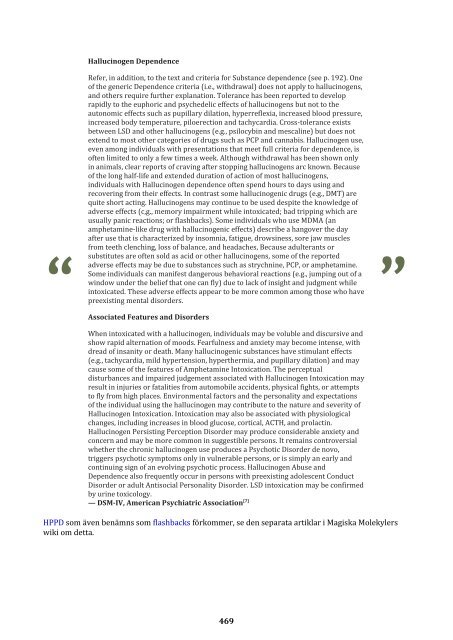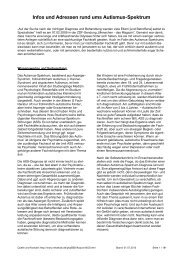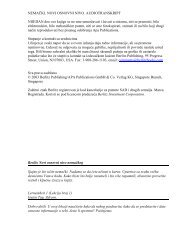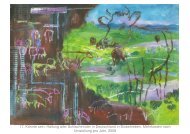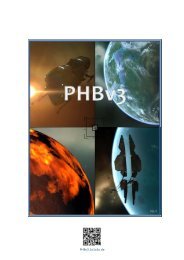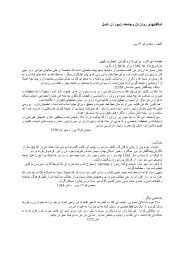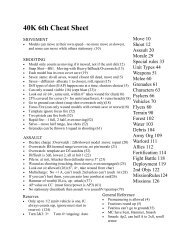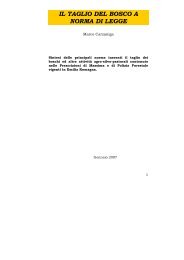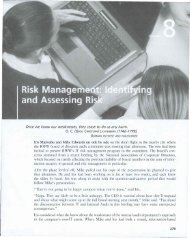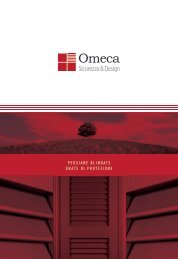- Page 1 and 2:
Legaliseringsguiden Genomgång av n
- Page 3 and 4:
Innehållsförteckning Förord ....
- Page 5 and 6:
Argument för legalisering eller de
- Page 7 and 8:
2013: All-Party Parliamentary Group
- Page 9 and 10:
Möjliga tolkningar av resultaten .
- Page 11 and 12:
ukar anklagas för att inte ha någ
- Page 13 and 14:
Svensk förbudspolitik Är den Sven
- Page 15 and 16:
policy. As far as estimating the su
- Page 17 and 18:
I en artikel från 2009 sågar Bör
- Page 19 and 20:
En jämförelse av drogdödligheten
- Page 21 and 22:
Professor Ted Goldberg gör en jäm
- Page 23 and 24:
Läsvärt Källor media. Co
- Page 25 and 26:
Därmed kan man befästa att motst
- Page 27 and 28:
“ Sverige utfärdade enligt konve
- Page 29 and 30:
Försöken med en legal förskrivni
- Page 31 and 32:
Efter ett möte med Expressens reda
- Page 33 and 34:
“ "Regeringen har det narkotikafr
- Page 35 and 36:
1999 Resten av de psilocybin/psiloc
- Page 37 and 38:
2001 En alkoholpolitisk handlingspl
- Page 39 and 40:
“ "As a result of their influence
- Page 41 and 42:
“ Narconon sponsras av Internatio
- Page 43 and 44:
anser vara felaktiga. Observera att
- Page 45 and 46:
... Cannabisrökaren själv har lä
- Page 47 and 48:
“ Om tonårshjärnan är ett gamm
- Page 49 and 50:
-Dessutom urholkar cannabis dig som
- Page 51 and 52:
säger inte studien så mycket mer
- Page 53 and 54:
framgår, de flesta referenserna in
- Page 55 and 56:
Osäkert vad Lundqvist refererar ti
- Page 57 and 58:
Napoleon förbjuder cannabis Napole
- Page 59 and 60:
The US was relatively marginal to t
- Page 61 and 62:
pharmaceutical interests throughout
- Page 63 and 64:
1914 Lagen "The Harrison Act" gör
- Page 65 and 66:
white women of the south are the di
- Page 67 and 68:
1940-talet 1943 släpps La Guardia-
- Page 69 and 70:
Richard Nixon War On Drugs 1972: ht
- Page 71 and 72:
1990-talet Bush den äldre fortsät
- Page 73 and 74:
45. ↑ Obama and His Pot-Smoking
- Page 75 and 76:
Beslagen av narkotika ökar, vilket
- Page 77 and 78:
Dödsfall I ECNNs statistiska bulle
- Page 79 and 80:
“ "Mellan 1988 och 2010 har antal
- Page 81 and 82:
Kan ökade straff/repressiva åtgä
- Page 83 and 84:
in 1990 (C.A.N., 2003, p. 240). In
- Page 85 and 86:
Utifrån samma modell gjorde förfa
- Page 87 and 88:
Källa: A Comparison of the Cost-ef
- Page 89 and 90:
“ Under 2003 handlade svenskarna
- Page 91 and 92:
Miljöförstöring Följande upplys
- Page 93 and 94:
Medias roll i propagandan Media, en
- Page 95 and 96:
apporterades i 2% av fallen trots a
- Page 97 and 98:
Ted Goldberg vs. Maria Larsson, TV4
- Page 99 and 100:
Uldall, Jepsen & Lund (1992) påpek
- Page 101 and 102:
Testar man så fastnar man: http://
- Page 103 and 104:
I boken "Hasch - himmel och helvete
- Page 105 and 106:
“ Boken är en fascinerande resa
- Page 107 and 108:
“ You know, it's a funny thing, e
- Page 109 and 110:
“ Legalization won’t be an imme
- Page 111 and 112:
Rätten till medicinskt bruk Man ka
- Page 113 and 114:
physical and emotional distress the
- Page 115 and 116:
John Walters om "Proposal One" 2008
- Page 117 and 118:
Ramström använder bortförklaring
- Page 119 and 120:
“ Georges van Speybrouck i Anvers
- Page 121 and 122:
protracted labor during childbirth.
- Page 123 and 124:
Medicinska användningsområden fö
- Page 125 and 126:
“ "Our results indicate that cann
- Page 127 and 128:
Kronisk smärta Många människor l
- Page 129 and 130:
“ "One month prior to a recent ou
- Page 131 and 132:
“ "Of particular interest is the
- Page 133 and 134:
Humant immunbristvirus (HIV) & AIDS
- Page 135 and 136:
En annan studie visar att andra sub
- Page 137 and 138:
med två dagliga behandlingar var t
- Page 139 and 140:
Se även: Cannabis and glaucoma - T
- Page 141 and 142:
26. ↑ Multicenter, double-blind,
- Page 143 and 144:
127. ↑ Cannabidiol: a promising d
- Page 145 and 146:
Medicinska användningsområden fö
- Page 147 and 148:
“ Bob Wold doesn't seem like your
- Page 149 and 150:
En studie som andra forskare gjorde
- Page 151 and 152:
En randomiserad, dubbelblind, korsa
- Page 153 and 154:
Psilocybin May Bring About Lasting
- Page 155 and 156:
offer inte stämmer. Men det finns
- Page 157 and 158:
Synen på personlig frihet Tidiga i
- Page 159 and 160:
to the public, nor occasions percep
- Page 161 and 162:
From this concept of government act
- Page 163 and 164:
mister förhållanden, körkort, jo
- Page 165 and 166:
... med legalisering menar jag att
- Page 167 and 168:
“ As the Vienna Declaration highl
- Page 169 and 170:
Positiva konsekvenser av en tillåt
- Page 171 and 172:
I Kalifornien såg man att ungdomsb
- Page 173 and 174:
ack, rereads, edits, approves. The
- Page 175 and 176:
Behandlingsprogram När det kommer
- Page 177 and 178:
Minskad alkoholkonsumtion Cirka en
- Page 179 and 180:
6. ↑ BBC 2011-03-31: Drug laws 'm
- Page 181 and 182:
“ I den omfattande litteraturen o
- Page 183 and 184:
för att inte omgivningen ska bli d
- Page 185 and 186:
2008 undersökte en grupp forskare
- Page 187 and 188:
gains, recreational consumers will
- Page 189 and 190:
A cross-national comparison between
- Page 191 and 192:
2001 that would affect the data. Th
- Page 193 and 194:
5. ↑ Estimating illicit financial
- Page 195 and 196:
http://www.youtube.com/watch?v=T2va
- Page 197 and 198:
not others, such as drug use. There
- Page 199 and 200:
Källor 1. ↑ 1,0 1,1 Report Of Th
- Page 201 and 202:
The personality changes observed wh
- Page 203 and 204:
activity carried out by people who
- Page 205 and 206:
2006-2009: Transform Drug Policy Fo
- Page 207 and 208:
4. Redirect repressive strategies t
- Page 209 and 210:
As part of efforts to encourage res
- Page 211 and 212:
Deras rapport som släpptes 2013 [1
- Page 213 and 214:
“ Källor *The decriminalization
- Page 215 and 216:
demografisk användarskifte av cann
- Page 217 and 218:
Brasilien disingenuous in its oppos
- Page 219 and 220:
Innehav är inte juridiskt dekrimin
- Page 221 and 222:
Kanadas liberala parti hade en stä
- Page 223 and 224:
förändrade politik kan anses leda
- Page 225 and 226:
Hughes och Stevens har även gjort
- Page 227 and 228:
Sedan mitten på 1990-talet har det
- Page 229 and 230:
3. ↑ Argentina: Reform on the way
- Page 231 and 232:
Analyser av argument mot cannabis o
- Page 233 and 234:
Ett par noteringar om svenskens fö
- Page 235 and 236:
inaktiva. Alkohol har en akut toxic
- Page 237 and 238:
“ Frankrike och Ungern, två län
- Page 239 and 240:
Thomas Lundqvist I rapporten "Alkoh
- Page 241 and 242:
Trots att det finns fler som dricke
- Page 243 and 244:
even the most worst case scenario,
- Page 245 and 246:
“ "Scientific evidence overwhelmi
- Page 247 and 248:
2010 gjordes en åter igen en bedö
- Page 249 and 250:
Aggressivitet och alkohol/cannabis
- Page 251 and 252:
Experters åsikter om cannabis vs a
- Page 253 and 254:
“ “ The major acute risks of al
- Page 255 and 256:
Cannabis farlighet och förklaringa
- Page 257 and 258:
moderns blodomlopp till fostrets ut
- Page 259 and 260:
1930: "Marihuana is responsible for
- Page 261 and 262:
Argument från förbudsförespråka
- Page 263 and 264:
fysiskt beroende. Men faktum kvarst
- Page 265 and 266:
Recurrent substance-related legal p
- Page 267 and 268:
5% and 10% of regular users (using
- Page 269 and 270:
Här är exempel på kritiken i en
- Page 271 and 272:
to baseline by the end of a 45-day
- Page 273 and 274:
Australiska NCPIC (National Cannabi
- Page 275 and 276:
träningspass hade mängden cannabi
- Page 277 and 278:
Depression, Anxiety, Difficulty con
- Page 279 and 280:
43. ↑ Danger Factors of “drugs
- Page 281 and 282:
Reuters Health. Based on the findin
- Page 283 and 284:
- Tidigare kallade man allting för
- Page 285 and 286:
och inkluderar exempelvis vanföres
- Page 287 and 288:
I en artikel som publicerades i tid
- Page 289 and 290:
if you use a lot of it, will make y
- Page 291 and 292:
— Assessing the impact of cannabi
- Page 293 and 294:
the number of people that need to s
- Page 295 and 296:
“ The authors note the double des
- Page 297 and 298:
and suggest that the role of cannab
- Page 299 and 300:
En Svensk forskning rapporterade 20
- Page 301 and 302:
Cannabis och dödsfall "Kan man d
- Page 303 and 304:
mest om detta är forskaren Anna Fu
- Page 305 and 306:
stack ut mest var en serie mycket v
- Page 307 and 308:
undersökta självmord genom hopp f
- Page 309 and 310:
“ In summary, enormous doses of D
- Page 311 and 312:
ehöva röka nästan sjuhundra kilo
- Page 313 and 314:
den snabbt. Man kunde även se att
- Page 315 and 316:
legalization of medical marijuana a
- Page 317 and 318:
18. ↑ LD50 är 0.5-1.0 mg/kg för
- Page 319 and 320:
elieved to be involved in emotional
- Page 321 and 322:
Cannabis, alkohol och vit hjärnsub
- Page 323 and 324:
39. ↑ " Zhang M, Martin BR, Adler
- Page 325 and 326:
“ 14. Cannabisrökningens skador
- Page 327 and 328:
tidsmässig organisation men utgör
- Page 329 and 330:
performance (Chait and Perry 1994;A
- Page 331 and 332:
“ This study for the first time a
- Page 333 and 334:
demonstrated that alcohol detriment
- Page 335 and 336:
En studie från 2001 visade att det
- Page 337 and 338:
“ In this paper, the authors revi
- Page 339 and 340:
education, gender, gender × group
- Page 341 and 342:
“ ...tonåringar som började rö
- Page 343 and 344:
studies present in the first meta-a
- Page 345 and 346:
17. ↑ Treatment of Tourette syndr
- Page 347 and 348:
funktionsdefekter (oftast subtila)
- Page 349 and 350:
Den amerikanska myndigheten "Nation
- Page 351 and 352:
“ The effects of cannabis depend
- Page 353 and 354:
However, compared with abstainers,
- Page 355 and 356:
“ ...ett tillstånd av avtrubbnin
- Page 357 and 358:
Studiens författare går till och
- Page 359 and 360:
and San Francisco oncologist Donald
- Page 361 and 362:
isken att utveckla KOL. cancer i lu
- Page 363 and 364:
I en ny studie från Los Angeles ly
- Page 365 and 366:
Det finns dock även nyare studier
- Page 367 and 368:
David Nutt kritiserar pressreleasen
- Page 369 and 370:
users. — Time Magazine [34] Se ä
- Page 371 and 372:
Alternativa administeringsmetoder I
- Page 373 and 374:
Argument från förbudsförespråka
- Page 375 and 376:
hours. ... The active metabolite 11
- Page 377 and 378:
THC lagras i hjärnan I en genomgå
- Page 379 and 380:
“ The course of plasma THC concen
- Page 381 and 382:
Då blodprover alltid har en lägre
- Page 383 and 384:
Argument från förbudsförespråka
- Page 385 and 386:
“ As mentioned, the aim of Robbe
- Page 387 and 388:
to slow down and drive more cautiou
- Page 389 and 390:
hypothesis is still controversial.
- Page 391 and 392:
increase in distance between vehicl
- Page 393 and 394:
“ Subjective effects and willingn
- Page 395 and 396:
fatalities involving alcohol is con
- Page 397 and 398:
THC >2ng/ml 1.74 Hunter et al. (199
- Page 399 and 400:
av Sveriges Radio som rapporterade
- Page 401 and 402:
som sömnighet eller yrsel, som kan
- Page 403 and 404:
“ When driving conditions and tim
- Page 405 and 406:
Ibland skiljer man på inkörsports
- Page 407 and 408:
Är frågan om cannabis roll som in
- Page 409 and 410:
... Men ingen annan predisponerande
- Page 411 and 412:
Den kanadensiska senatens rapport f
- Page 413 and 414:
“ The Pittsburgh researchers trac
- Page 415 and 416:
drug use even after controlling for
- Page 417 and 418: “ Analyses used data from World H
- Page 419 and 420: Vad är inkörsport till vad? Så o
- Page 421 and 422: Cannabis påstådda potensökning A
- Page 423 and 424: Att det skett en förändring stöd
- Page 425 and 426: En annan sak som är till nackdel f
- Page 427 and 428: En uppföljande forskning från 201
- Page 429 and 430: Hascholjans värden flyger fram och
- Page 431 and 432: Vad händer om cannabisen är stark
- Page 433 and 434: “ An alternative possibility is t
- Page 435 and 436: 6. ↑ Variation in the THC content
- Page 437 and 438: Men vad visar detta egentligen? Int
- Page 439 and 440: “ Påverkan på födelsevikt med
- Page 441 and 442: EMCDDA sammanfattar forskningsläge
- Page 443 and 444: Cancer Gibson et al, 1983; Hatch an
- Page 445 and 446: hade ökat i prefrontala cortex och
- Page 447 and 448: och standardiserade frågeformulär
- Page 449 and 450: A recent study from the Pittsburgh
- Page 451 and 452: Dåliga argument mot cannabis I arg
- Page 453 and 454: Cannabis hör inte till vår kultur
- Page 455 and 456: Cannabisrökare blir våldsamma "Pe
- Page 457 and 458: Jämförelser av våldsstatistiken
- Page 459 and 460: Cannabis orsakar kromosomskador På
- Page 461 and 462: Scientologerna som driver "Stiftels
- Page 463 and 464: förändrad uppfattningsförmåga.
- Page 465 and 466: “ Exempel på allvarliga biverkni
- Page 467: ehagliga och skrämmande upplevelse
- Page 471 and 472: En metaanalys från 1999 som gick i
- Page 473 and 474: complete absence of the drug. Flash
- Page 475 and 476: schizofreni-liknande delen av upple
- Page 477 and 478: highlighted problems triggered by o
- Page 479 and 480: Argumentations teknik 479
- Page 481 and 482: Steg 7 Analysera/korrigera: Hur gic
- Page 483 and 484: “ Post hoc, ergo propter hoc En p
- Page 485 and 486: “ Petitio principii På engelska
- Page 487 and 488: “ Argumentum ad baculum Ungefär
- Page 489 and 490: Organisationsmodeller tal och prese
- Page 491 and 492: Du bör veta ungefär hur många se
- Page 493 and 494: Slutsats I legaliseringsguidens inl
- Page 495 and 496: Register alkohol, 17, 24, 30, 32, 3


